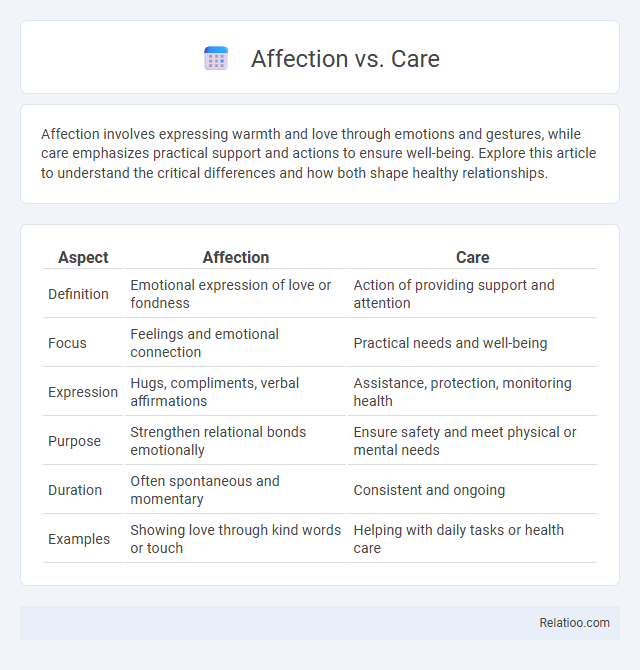Affection involves expressing warmth and love through emotions and gestures, while care emphasizes practical support and actions to ensure well-being. Explore this article to understand the critical differences and how both shape healthy relationships.
Table of Comparison
| Aspect | Affection | Care |
|---|---|---|
| Definition | Emotional expression of love or fondness | Action of providing support and attention |
| Focus | Feelings and emotional connection | Practical needs and well-being |
| Expression | Hugs, compliments, verbal affirmations | Assistance, protection, monitoring health |
| Purpose | Strengthen relational bonds emotionally | Ensure safety and meet physical or mental needs |
| Duration | Often spontaneous and momentary | Consistent and ongoing |
| Examples | Showing love through kind words or touch | Helping with daily tasks or health care |
Understanding Affection and Care: Key Differences
Understanding affection and care involves recognizing affection as the emotional expression of warmth and fondness, while care emphasizes practical actions aimed at supporting someone's well-being. Affection manifests through gestures like hugs, verbal affirmations, and expressions of love, whereas care includes activities such as providing assistance, ensuring safety, and meeting physical needs. Both are essential for healthy relationships, with affection fostering emotional bonds and care addressing tangible needs.
The Psychology Behind Affection
The psychology behind affection reveals its role as an emotional expression that fosters bonding and attachment through physical touch or verbal affirmations. Care, by contrast, emphasizes actions aimed at supporting well-being and meeting needs, often devoid of the spontaneous emotional warmth found in affection. Understanding affection involves exploring neurological responses linked to oxytocin release, which enhances social connection and emotional security.
The Essence of Genuine Care
Genuine care embodies an active commitment to the well-being of others, going beyond mere affection, which is often a passive feeling of fondness or attachment. Unlike affection, genuine care involves consistent actions and empathy that address the needs and emotions of those you value. Your ability to demonstrate true care fosters trust, deepens relationships, and promotes emotional security.
How Affection Manifests in Daily Life
Affection manifests in daily life through physical touch such as hugs, gentle touches, and warm smiles that create emotional bonds and convey love and appreciation. It also appears in verbal expressions like compliments, kind words, and attentive listening, which strengthen interpersonal connections and promote emotional well-being. Unlike care, which involves actions focused on meeting practical needs, affection emphasizes emotional warmth and positive feelings in relationships.
Signs of True Care in Relationships
True care in relationships manifests through consistent actions such as active listening, support during difficult times, and prioritizing the partner's well-being. Unlike affection, which often involves expressions of love and physical touch, genuine care is demonstrated by reliability, empathy, and thoughtful gestures that meet emotional and practical needs. Signs of true care include remembering important details, offering help without being asked, and maintaining patience and understanding during conflicts.
Affection vs Care: Emotional Impact
Affection involves expressing genuine warmth and love that creates a strong emotional connection, while care emphasizes actions taken to support and protect someone's well-being. Your emotional impact from affection often feels deeper and more personal, fostering intimacy and trust. Care, although essential, tends to manifest through responsibility and practical support, which might not always evoke the same emotional intensity.
The Role of Affection in Building Bonds
Affection plays a crucial role in building bonds by fostering emotional intimacy and trust, which strengthens relationships over time. Unlike care, which emphasizes practical support, affection involves expressing warmth and positive feelings that nurture connection and attachment. This emotional expression enhances bonding by promoting feelings of security and belonging among individuals.
Care as a Foundation for Long-Term Connection
Care acts as the foundational element in building long-term connections by fostering trust, security, and emotional support. Affection expresses warmth and fondness, often through physical touch or verbal affirmations, while compassion involves empathizing with and responding to another's suffering. Prioritizing care creates a stable environment where affection and compassion can thrive, strengthening relationship resilience over time.
Balancing Affection and Care for Healthy Relationships
Balancing affection and care is essential for healthy relationships, as affection involves expressing love and warmth, while care focuses on meeting your partner's needs and well-being. Too much affection without care can feel superficial, whereas care without affection might seem distant or obligatory. Your relationships thrive when both elements harmonize, fostering emotional connection and trust.
Choosing Between Affection and Care: What Matters Most?
Choosing between affection and care depends on the context and emotional needs of the relationship, as affection expresses warmth and emotional connection while care emphasizes practical support and responsibility. Prioritizing care can ensure well-being and stability, especially in times of crisis, whereas affection fosters intimacy and emotional bonding. Understanding the balance between these elements is crucial for nurturing healthy and resilient relationships.

Infographic: Affection vs Care
 relatioo.com
relatioo.com